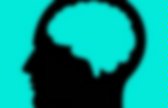

Mozart's daily routine, the puzzlement of why we experience time as linear, Willa Cather on the life-changing advice that made her a writer, and more. In 1984, astronomer Jill Tarter founded SETI — an institute dedicated to the search for extraterrestrial intelligence.
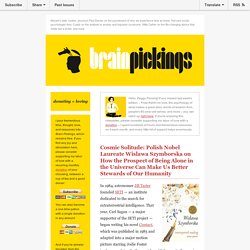
That year, Carl Sagan — a major supporter of the SETI project — began writing his novel Contact, which was published in 1985 and adapted into a major motion picture starring Jodie Foster twelve years later. In the most beautiful scene in the movie, Foster’s character, inspired by Dr. Tarter, peers out her spaceship window as she approaches an extraordinary alien world and gasps: “They should’ve sent a poet!” Several months before the launch of SETI, it was indeed one of humanity’s greatest poets — Polish Nobel laureate Wislawa Szymborska (July 2, 1923–February 1, 2012) — who addressed the abiding allure of extraterrestrial life by way of its mirror image: the possibility that we might be alone in the universe, what it reveals about our most elemental fears, and how it can ennoble the human spirit. Jodie Foster in Contact, 1997. Davies writes: Complement it with T.S. Mr. Neruda's ode to silence, in praise of shadows, Tom Wolfe's magnificent commencement address, the wisest little boy in the world, and more.
Hello, Peggy Fleming!

If you missed last week's edition – Oliver Sacks's sublime memoir of love, lunacy, and a life fully lived, Adrienne Rich on how silence fertilizes the soul, Anne Sexton animated, and more – you can catch up right here. And if you're enjoying this, please consider supporting with a modest donation – every little bit helps, and comes enormously appreciated.
Keeping Quiet: Sylvia Boorstein Reads Pablo Neruda's Beautiful Ode to Silence “Make a place to sit down. Sit down. Oliver Sacks's sublime memoir of love, lunacy, and a life fully lived, Adrienne Rich on how silence fertilizes the soul, Anne Sexton animated and more. A Zen master on how to do "hugging meditation," our strange experience of time, how to find your bliss at the crossroads of Should and Must and more. Hello, you!
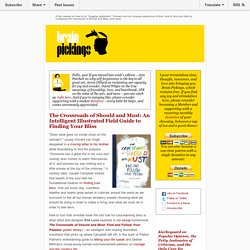
If you missed last week's edition – Ann Patchett on why self-forgiveness is the key to all great art, Annie Dillard on reclaiming our capacity for joy and wonder, David Whyte on the true meanings of friendship, love, and heartbreak, JFK on the value of the arts, and more – you can catch up right here. And if you're enjoying this, please consider supporting with a modest donation – every little bit helps, and comes enormously appreciated. The Crossroads of Should and Must: An Intelligent Illustrated Field Guide to Finding Your Bliss "Does what goes on inside show on the outside? ," young Vincent van Gogh despaired in a moving letter to his brother while floundering to find his purpose. Luna writes: Should is how other people want us to live our lives. When we choose Should, we’re choosing to live our life for someone or something other than ourselves.
She offers a counterpoint: Must is different. Annie Dillard on the two ways of seeing, Kafka's letter to his emotionally abusive father, how Steinbeck used the diary as a tool of discipline & more. Mary Oliver on how habit gives shape to our inner lives, what math reveals about the secret of lasting relationships, and more. Hello, Peggy Fleming!
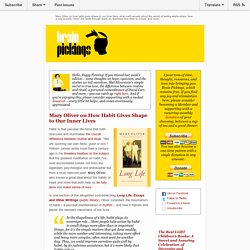
If you missed last week's edition – some thoughts on hope, cynicism, and the stories we tell ourselves, Shel Silverstein's simple secret to true love, the difference between routine and ritual, a personal remembrance of David Carr, and more – you can catch up right here. And if you're enjoying this, please consider supporting with a modest donation – every little bit helps, and comes enormously appreciated. Mary Oliver on How Habit Gives Shape to Our Inner Lives Habit is that peculiar life-force that both obscures and illuminates the crucial difference between routine and ritual. "We are spinning our own fates, good or evil," William James wrote more than a century ago in his timeless treatise on the subject.
In one section of the altogether soul-stretching Long Life: Essays and Other Writings (public library), Oliver considers the mesmerism of habit – a peculiar manifestation of rhythm – and how it frames and paces the rampant messiness of our lives: Fry explains: Some thoughts on hope, cynicism and the stories we tell ourselves, Shel Silverstein on the secret of love, a personal remembrance of David Carr & more.
Hello, Peggy Fleming!
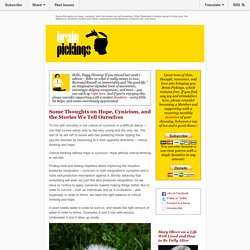
If you missed last week's edition – Rilke on what it really means to love, Bertrand Russell on immortality and "the good life," an imaginative alphabet book of uncommon, stereotype-defying occupations, and more – you can catch up right here. And if you're enjoying this, please consider supporting with a modest donation – every little bit helps, and comes enormously appreciated.
Some Thoughts on Hope, Cynicism, and the Stories We Tell Ourselves To live with sincerity in our culture of cynicism is a difficult dance – one that comes easily only to the very young and the very old. The rest of us are left to tussle with two polarizing forces ripping the psyche asunder by beckoning to it from opposite directions – critical thinking and hope.
Critical thinking without hope is cynicism. Finding fault and feeling hopeless about improving the situation produces resignation – cynicism is both resignation's symptom and a futile self-protection mechanism against it. Anne Lamott on how we endure in a crazy world, Mark Strand on the heartbeat of creative work, how Lewis Carroll can help us make email more civil&more. Hello, Peggy Fleming!
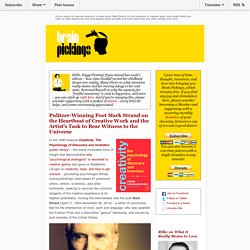
If you missed last week's edition – how Jane Goodall turned her childhood dream into reality, Mary Oliver on what attention really means and her moving eulogy to her soul mate, Bertrand Russell on why the capacity for "fruitful monotony" is vital to happiness, and more – you can catch up right here. And if you're enjoying this, please consider supporting with a modest donation – every little bit helps, and comes enormously appreciated. Pulitzer-Winning Poet Mark Strand on the Heartbeat of Creative Work and the Artist's Task to Bear Witness to the Universe For Strand, Csikszentmihalyi writes, "the poet’s responsibility to be a witness, a recorder of experience, is part of the broader responsibility we all have for keeping the universe ordered through our consciousness.
" He quotes the poet's own reflection – which calls to mind Rilke's – on how our sense of mortality, our awareness that we are a cosmic accident, fuels most creative work: Strand speaks to this himself: Kierkegaard on Boredom, Why Cat Listicles Fail to Answer the Soul’s Cry, and the Only True Cure for Existential Emptiness. By Maria Popova “The more a person limits himself, the more resourceful he becomes.”
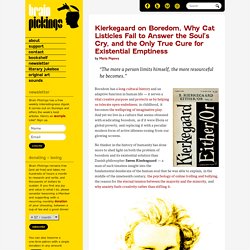
Boredom has a long cultural history and an adaptive function in human life — it serves a vital creative purpose and protects us by helping us tolerate open-endedness; in childhood, it becomes the wellspring of imaginative play. And yet we live in a culture that seems obsessed with eradicating boredom, as if it were Ebola or global poverty, and replacing it with a peculiar modern form of active idleness oozing from our glowing screens. In a section of his 1843 masterwork Either/Or: A Fragment of Life (public library), which also gave us Kierkegaard on our greatest source of unhappiness, the Danish philosopher defines boredom as a sense of emptiness and examines it not as an absence of stimulation but as an absence of meaning — an idea that also explains why it’s possible, today more than ever, to be overstimulated but existentially bored. 15 worthy resolutions for 2015 from some of history's greatest minds, from Virginia Woolf to Bruce Lee. Hello, Peggy Fleming!
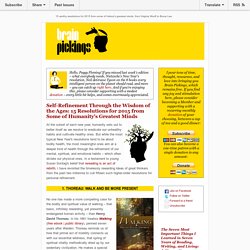
If you missed last week's edition – what everybody needs, Nietzsche's New Year's resolution, Neil deGrasse Tyson on the 8 books every intelligent person on the planet should read, and more – you can catch up right here. And if you're enjoying this, please consider supporting with a modest donation – every little bit helps, and comes enormously appreciated. At the outset of each new year, humanity sets out to better itself as we resolve to eradicate our unhealthy habits and cultivate healthy ones. But while the most typical New Year's resolutions tend to be about bodily health, the most meaningful ones aim at a deeper kind of health through the refinement of our mental, spiritual, and emotional habits – which often dictate our physical ones. No one has made a more compelling case for the bodily and spiritual value of walking – that basic, infinitely rewarding, yet presently endangered human activity – than Henry David Thoreau.
Read more here. The best Brain Pickings articles of the year. Hey Peggy Fleming!
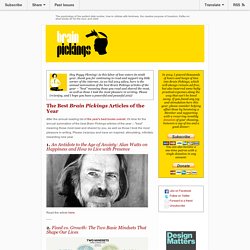
As this labor of love enters its ninth year, thank you for continuing to read and support my little corner of the internet. As we bid 2014 adieu, here is the annual summation of the best Brain Pickings articles of the year – "best" meaning those you read and shared the most, as well as those I took the most pleasure in writing. The best art, design, and photography books of the year, a tender wordless story about how we ennoble each other in friendship, and more. Hey Peggy Fleming!
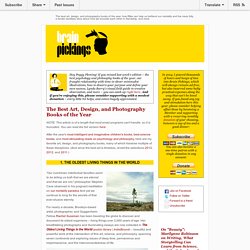
Brain Pickings. How melancholy expands our capacity for creativity, the best science books of the year, beautifully untranslatable words from around the world & more. Hey Peggy Fleming! If you missed last week's edition – the best children's books of the year, Thoreau on the art of walking, Ursula K. Le Guin on the secret of success in writing and any craft, and more – you can catch up right here.
And if you're enjoying this, please consider supporting with a modest donation – every little bit helps, and comes enormously appreciated. (NOTE: Most email programs get grumpy about messages exceeding a certain number of characters, so due to their length, some articles in this week's email digest have been truncated – you can read the full versions on the site by following the respective "READ MORE" links.) Anne Lamott on Grief, Grace, and Gratitude "Grief, when it comes, is nothing like we expect it to be," Joan Didion wrote in her magnificent meditation on the subject.
From the very preface, titled "Victory Lap," Lamott stops the stride: Dead Huon pine, 10,500 years old, from Rachel Sussman's The Oldest Living Things in the World. Leonard Cohen and the art of stillness, Anne Lamott on letting yourself be seen, my conversation with Amanda Palmer on the art of asking, and more. Hey Peggy Fleming! If you missed last week's edition – why "psychological androgyny" is key to creativity, Bruce Springsteen's favorite books, the elusive art of inner wholeness, Neruda's life as an illustrated love letter to language, and more – you can catch up right here.
And if you're enjoying this, please consider supporting with a modest donation – every little bit helps, and comes enormously appreciated. Pico Iyer on What Leonard Cohen Teaches Us about Presence and the Art of Stillness "Faith is the ability to honor stillness at some moments," Alan Lightman wrote in his sublime meditation on science and spirituality, "and at others to ride the passion and exuberance. " In his conversation with E.O. Iyer begins by recounting a snaking drive up the San Gabriel Mountains outside Los Angeles to visit his boyhood hero – legendary singer-songwriter Leonard Cohen. Leonard Cohen had come to this Old World redoubt to make a life – an art – out of stillness. Trappings and charm wear off... The best relationship advice you'll ever get, what cognitive science reveals about the perfect daily routine and the psychology of writing, and more.
Hey Peggy Fleming! If you missed last week's edition – Werner Herzog on creativity and making a living of doing what you love, Tolstoy's letters to Gandhi on why we hurt each other, Maya Angelou on courage and facing evil, and more – you can catch up right here. And if you're enjoying this, please consider supporting with a modest donation – every little bit helps, and comes enormously appreciated. The Psychology of Writing and the Cognitive Science of the Perfect Daily Routine Reflecting on the ritualization of creativity, Bukowski famously scoffed that "air and light and time and space have nothing to do with. " Samuel Johnson similarly contended that "a man may write at any time, if he will set himself doggedly to it. " How to be alone, Seneca on the shortness of life and the art of living wide rather than long, a tender wordless story about kindness, and more. The psychology and practicalities of becoming a successful artist, David Foster Wallace on writing and how we become who we are, and more.
Hey Maria! Albert Camus on living a meaningful life and why happiness is our moral obligation, Joni Mitchell on creativity, Alan Watts on the art of timing. Hey Peggy Fleming! Kierkegaard on why haters hate, the best infographics of the year, Ursula Le Guin on being a man, Nietzsche on the value of suffering, and more. Hey Peggy Fleming! What books do for the human soul, the mind-bender of what makes you and your childhood self the same person despite a lifetime of change, and more. How we become who we are, Mark Twain on learning compassion, an illustrated homage to the secret sidekicks behind creative geniuses, and more.
Hey Peggy Fleming! Neil Gaiman reimagines the Brothers Grimm, jazz icon Bill Evans on the creative process, a visual history of mapping the cosmos, and more. Hey Peggy Fleming! Why "psychological androgyny" is key to creativity, Springsteen's favorite books, Neruda illustrated, the elusive art of inner wholeness, and more. Hey Peggy Fleming! Brain Pickings.